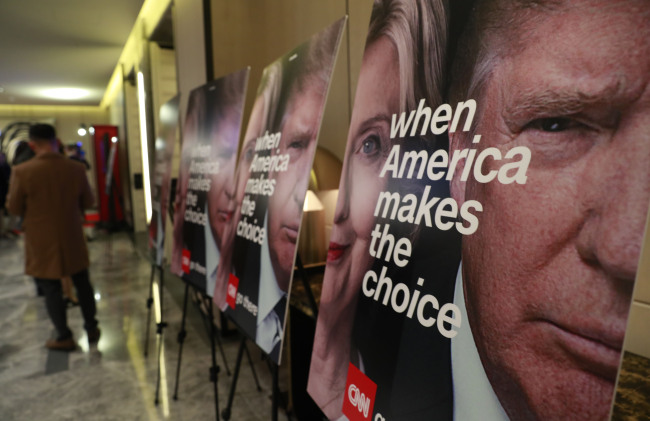Donald Trump’s win in the US presidential election casts uncertainties over Washington’s Asia policy and its joint defense posture with Seoul, as he has hinted at a sweeping departure from the Democratic administration’s approach.
The billionaire real estate mogul has yet to offer a clear foreign and security policy vision, other than an isolationist concept with the “America First” motto. Throughout the campaign trail, however, he was adamant that South Korea should pay greater defense costs, labeling the country as a “free rider” and suggesting he might withdraw US troops from here.
The US would be “better off” if Seoul and Tokyo developed their own nuclear weapons, he said, while branding a South Korea-US free trade pact as a “job killer” and pledging to drop out from the 12-nation Trans-Pacific Partnership, which Seoul seeks to join.
“Just to go down the list, we defend Japan, we defend Germany, we defend South Korea, we defend Saudi Arabia, we defend countries. They do not pay us,” he said during the first presidential debate on Sept. 26.
“They should be paying us, because we are providing tremendous service and we’re losing a fortune. … We are losing billions and billions of dollars.”
On North Korea, Trump has displayed his willingness to meet with leader Kim Jong-un over hamburgers, rather than a state dinner, saying he would have “no problem speaking to him.” He has also called the young ruler a “maniac” who deserves credit for his leadership nonetheless.
At one point, as a solution to the drawn-out impasse, he even indicated that China should invade the North. Other times he said Washington should have addressed the issue in the nuclear agreement with Iran, while denouncing it as the “worst deal I think I’ve ever seen negotiated.”
This marks a contrast to the Barack Obama and Park Geun-hye governments’ principle that they will not engage in dialogue with the unruly regime unless it expresses serious commitment to denuclearization.
Peter Hoekstra, a former congressman in the Trump campaign, signaled during a seminar in Washington last month that the Trump leadership would “go back” and overhaul the North Korea policy, saying the current strategies have not “developed the kind of results that we want.”
“You look at North Korea, we’re doing nothing there. China should solve that problem for us. China should go into North Korea. China is totally powerful as it relates to North Korea,” Trump said during the presidential debate.
“Iran is one of their biggest trading partners. Iran has power over North Korea. When they made that horrible deal with Iran, they should have included the fact that they do something with respect to North Korea.”
With the race being too close to call, Seoul had been trying to foster a network with both camps through its embassy and consulates-general across the US and meetings with visiting scholars who advise Trump and may possibly join his administration.
They include Richard Haass, president at the Council on Foreign Relations; Ed Feulner, a former president of the Heritage Foundation; Sen. Jeff Sessions and Victor Cha, the Korea chair at the Center for Strategic and International Studies. Feulner is also a member of Trump’s presidential transition team led by New Jersey Gov. Chris Christie, along with Michael Flynn, a former director of the Defense Intelligence Agency.
The Foreign Ministry is considering sending a high-level official to Washington to facilitate policy coordination with Trump’s transition team.
Despite Trump’s controversial remarks, once he enters the White House, he might take a more practical approach from a “businessman’s point of view” and respect technocrats’ expertise in such complex issues as foreign policy and security, some officials and experts say.
“During our talks, when it comes to North Korea, I could not see much difference between the Democrats and Republican sides given the nature of the issue,” said a senior Foreign Ministry official who has met with many advisors to Trump and Hillary Clinton.
“There could be more pressure on us such as over defense burden-sharing, but major foreign policy lines will likely be retained, and (Trump) has several advisors who have sound policy views.”
Foreign Minister Yun Byung-se also expressed confidence in the continuity of the allies’ ongoing drive to ratchet up sanctions and pressure against Pyongyang.
“Trump has shown his perception of the North’s nuclear threats as one of the biggest problems the world faces, and his advisors on foreign affairs and security also stress the significance of strong sanctions and pressure,” he said at a meeting Wednesday with ruling party lawmakers.
“The policy line focusing on sanctions and pressure would basically live on under the next US administration, but things he mentioned in the lead-up to the election are to be materialized by the transition team, with which we plan to maintain close coordination.”
Another senior diplomat said, “It’s difficult to forecast the president-elect’s policy directions at this point but he will likely take a tougher line against China such as over the South China Sea dispute and he could call for Seoul to speak up on the issue in the name of rule of law.”
Lee Sang-hyun, a senior researcher at the Sejong Institute, offered a bleaker outlook, saying even before crafting a policy, the Trump administration would “consume a great deal of time and political muscle,” starting with the Cabinet formation.
“There are expectations that Trump would carry out policy based on realistic judgment, but having seen his behavior so far, others see it otherwise, saying such expectations may be naive or risky in light of his impulsive character and the relatively weak policy advice functions in his campaign,” Lee said in his analysis.
“Uncertainties are tremendous over the alliance and trade policy and the possibility is high that partisan strife will much deepen even in terms of East Asia policy that has largely been a domain for partisan cooperation.”
By Shin Hyon-hee (
heeshin@heraldcorp.com)








![[Today’s K-pop] Blackpink’s Jennie, Lisa invited to Coachella as solo acts](http://res.heraldm.com/phpwas/restmb_idxmake.php?idx=644&simg=/content/image/2024/11/21/20241121050099_0.jpg)